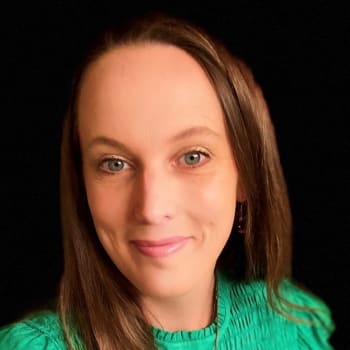Dr. Johanna Sweet
Associate Professor

Degrees
- Ed.D, The George Washington University, 2012 (Graduate of Executive Leadership Program: Human and Organizational Learning)
- M.B.A., East Carolina University, 2002
- B.A. in Communication Studies, University of North Carolina at Wilmington, 1999 (Minor in Leadership Studies)
Research & Teaching Interests
- TEACHING INTERESTS:
- Human resource management
- Training and development
- Organizational behavior
- Authorship of your life
- RESEARCH INTERESTS:
- Development of psychological capital (hope, self-efficacy, optimism and resilience) and its impact on organizations
- Self-authorship in the transition of student to professional
- Leadership development of new managers
- For a more detailed description, see the Statement of Research Interests below.
Scholarly Activities
- PAPER PRESENTATIONS AND CONFERENCE PROCEEDINGS:
- Smith, M., & Sweet, J. (2019, October). Relating Maslow’s hierarchy of needs to personal financial decision-making [Paper presentation] 2019 SE Informs Regional Conference, Myrtle Beach, SC.
- Sweet, J. (2018, October) Academic psychological capital, GPA, and retention [Paper presentation]. 2018 SE Informs Regional Conference, Myrtle Beach, SC.
- Sweet, J., & Swayze, S. (2018, February). Psychological capital and the multi-generational nursing workforce [Paper presentation]. The Academy of Human Resource Development 2018 International Research Conference in the Americas, Richmond, VA.
- Little, J. & Swayze, S. (2013, February). The relationship between the constructs of psychological capital and learning organization dimensions in a community medical center: An exploratory survey research study [Paper presentation]. The Academy of Human Resource Development 2013 International Research Conference in the Americas, Arlington, VA.
- Sweet, J., Swayze, S. & Richardson, D. (2010). Evaluating corporate sustainability [Research presentation]. New Horizon Research Conference, Washington, DC.
- POSTER PRESENTATIONS:
- Sweet, J., Curfman, E., & Helminsky, E. (2020, February). PsyCap and diversity in organizations: LGBTQ PsyCap awareness [Poster presentation]. The Academy of HumanResources Development 2020 International Research Conference in the Americas, Atlanta, GA.
- Sweet, J. (2020, February). Corporate psychological responsibility: CPR could save your organization: Introducing corporate psychological responsibility [Poster presentation]. The Academy of Human Resources Development 2020 International Research Conference in the Americas, Atlanta, GA.
- Sweet, J. (2019, February) PsyCap, student success, and retention [Poster presentation]. The Academy of Human Resources Development 2019 International Research Conference in the Americas, Louisville, KY.
- Sweet, J.. Virdi, M. & Busse, K. (2017, February) Examining psychological capital, perceived stress, and student success [Poster presentation]. The Academy of Human Resources Development 2017 International Research Conference in the Americas, San Antonio, TX.
- Whitecross, S. & Sweet, J. (2017, February) Mommy Wars [Poster presentation]. The Academy of Human Resources Development 2017 International Research Conference in the Americas, San Antonio, TX.
Books
- [Book Chapters] Swayze, S., Gronow, T., & Sweet, J. (2018). Using social media for healthcare recruiting. In Swayze & V. Ford (Eds.), Innovative Applications of Knowledge Discovery and Information Resources Management (pp. 211-227). Hershey, PA: IGI Global.
- [Book Case Study] Swayze, S., & Sweet, J. (2018). Carilion Clinic: E-recruitment and the shortage of nurses. Case study in book chapter “E-recruiting” in D. Waddill (Ed.), Digital HR (pp. 199-201). Alexandria, VA: Society of Human Resource Management.
Publications
- Sweet, J., & Wagner, S. (2022) Corporate Psychological Responsibility. (In progress)
- Smith, C. M., & Sweet, J. (2021). Analyzing the relationship between Maslow's Hierarchy of Needs and consumer spending patterns. Journal of Financial Service Professionals, 75(4).
- Sweet, J., & Swayze, S. (2020). Academic psychological capital: A novel approach to retention. Journal of College Student Retention: Research, Theory & Practice.
- Sweet, J., Swayze, S., & Busse, K. (2019). The relationships between psychological capital and GPA: A study of one freshmen cohort. Journal of Higher Education Theory and Practice, 19(2), 129-146.
- Sweet, J. & Swayze, S. (2017). The multi-generational nursing workforce: Analysis of psychological capital by generation and shift. Journal of Organizational Psychology, 17(4), 19-28.
- Little (Sweet), J. & Swayze, S. (2015). Employee perceptions of psychological capital and learning organization dimensions in a community medical center. Organizational Development Journal, 33(2). 79-104.
- Little (Sweet), J. (2014). Learning through 'Huddles' for Healthcare Leaders: Why do some work teams learn as a result of huddles and others do not? The Health Care Manager, 33(4), 1-7.
- Sweet, J. (2012). The relationship between psychological capital and learning organization dimensions in a community medical center: An exploratory survey research study (Doctoral dissertation). Retrieved from Proquest/UMI Dissertations.
Extracurricular
- Coordinator, Human Resource Management Concentration
- Internship Coordinator, Business & Economics Department
- Advisor, Roanoke College SHRM Student Chapter
- Presenter, Roanoke College Training Management Institute
- Member, Academy for Human Resource Management (AHRD)
- Member, Society for Human Resource Management
- Journal Reviewer and Publisher
Statement of Research Interests
- The pillars of my doctoral degree are leadership, organizational learning, adult learning and change. The program was scholarly practitioner focused and has a strong learning foundation in the social construction of knowledge.
- My dissertation topic was focused on exploring the relationship between psychological capital (self-efficacy hope, resilience and optimism) with a learning organization using quantitative methods. Additional areas of research interest include topics within positive organizational behavior such as motivation, leadership development and performance management.
- My research interest stems from the belief that organizations have a responsibility to their employees to provide an environment that will lead to sustainability beyond economic survival to human and psychological capital.